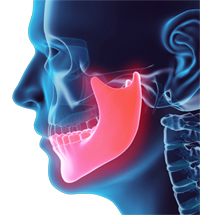
Finding good ways to treat TMJ-related muscle pain is important because most instances of TMJ-related pain in the jaw, face, neck and elsewhere are related to sore muscles. The problem in TMJ is often that the teeth, joints, and muscles aren’t in harmony. When the teeth come together, the jaw muscles are stressed, not relaxed. This makes the jaw muscles strain, trying to find a more relaxed position. The short-term result is sore muscles, but over time, the teeth and jaw joints can be damaged. Relaxing the muscles not only controls short-term symptoms, but prevents long-term damage that is difficult to repair.
A recent double-blind study conducted by the Department of Temporomandibular Disorders at the Medical University of Silesia in Katowice, Poland indicates that CBD may in fact be a viable option to treat TMJ-related muscle pain.
To test the muscle relaxant properties of CBD oil, researchers selected 60 patients who met the RDC/TMD (Research Diagnostic Criteria for Temporomandibular Disorders). These patients were divided into two groups with comparable average age (23.2 years vs. 22.6 years). Group 1 received CBD oil formula for topical use. Group 2 received a placebo.
Researchers measured muscle tension before treatment and after 14 days of treatment, using electromyography. People also rated their pain intensity using a 10-point scale. The results showed that people responded better to the CBD application than the placebo. In Group 1, muscle tension reduced 11% on the left and 13% on the right, compared to 0.23% and 3.3%, respectively, for the placebo group. Reduced muscle tension also led to reduced pain. In the treatment group, patients reported a 70% decrease in pain, compared to less than 10% for the placebo group.

TMJ, Stress and Anxiety Triangle | How CBD Can Help
In order to see how this study may be relevant, it’s important to take a look at what issues may lead to TMJ, what issues can TMJ lead to and how CBD fits into that equation.
STRESS
Unfortunately, stress affects many people. Stress is how the body reacts to and handles harmful situations. While our bodies are designed to handle small amounts of stress, ongoing or prolonged exposure to stressful situations can be harmful to our health.
Common symptoms of stress include:
- Bruxism, or severe grinding of the teeth
- Headache
- Muscle tension or pain
- Trouble sleeping
Stress and TMJ are often linked to each other. The symptoms of stress often manifest themselves in physical ways, often leading to a TMJ diagnosis.
TMJ
The jaw joint is one of the most complex joints in your body. Controlled by an intricate network of muscles, ligaments and other soft tissue, these joints can become misaligned, the muscles can spasm and nerve pain may present itself. For patients who have been diagnosed with TMJ, symptoms can look completely different from one person to another, which requires TMJ pain treatment to be customized to the person.
Common symptoms of TMJ include:
- Headache
- Aching pain in and around your ear
- Joint locking or popping
- Pain or tenderness in the cheek and jaw
- Pain or difficulty chewing
Because TMJ has such a wide variety of symptoms, even some that seem unrelated, TMJ can both cause anxiety and be caused by anxiety. There are some symptoms of TMJ, especially dizziness, tinnitus and headaches, that can be triggers for anxiety. And conversely, anxiety symptoms like tense muscles and jaw clenching can ultimately cause TMJ.
ANXIETY
Anxiety is an emotion felt by everyone at one time or another, but prolonged anxiety and anxiety disorders can affect your well-being and daily life. Patients who have been diagnosed with anxiety experience a variety of symptoms, both physical and psychological.
Common symptoms of anxiety include:
- Feeling nervous, restless or tense
- Difficulty controlling worry
- Feeling weak or tired
- Trouble sleeping
Like TMJ, anxiety can be both the symptom or the cause of TMJ. It all depends on your unique symptoms.
The Role of CBD
Now that we’ve explored what can lead to TMJ and what other issues may result from TMJ, we can look at how CBD may be beneficial in helping to alleviate these issues.
As we learned from the earlier referenced study, CBD has been shown to relieve muscle tension which is a contributing factor in TMJ. CBD’s anti-inflammatory properties have also been shown to relieve the chronic pain often associated with TMJ.
While research is still very preliminary, CBD is thought to ease anxiety and stress by helping the body process serotonin, a hormone and neurotransmitter that plays a role in regulating emotions. The process by which this occurs is thought to be similar to that of serotonin reuptake inhibitors (SSRI), a class of anxiety and depression medications.
SSRIs target a serotonin receptor called 5-HT1A and increase the availability of serotonin in the brain to help boost your mood. One 2019 study found that CBD enhanced 5-HT1A transmission in rats and reduced “anxiety-like behavior.”
Formal studies aside, anecdotal evidence suggests that while we may not yet know exactly how CBD works to relieve stress and anxiety, we know that in many cases it does:
“Of all the wellness tools in my toolbox, CBD oil has been the best addition to my life for anxiety,” said Carlene Thomas RDN and dietitian. “It worked immediately, effectively and effortlessly in a way that adaptogens and years of meditation hadn’t.”
PLEASE NOTE
The contents of this blog are provided for informational purposes only and are not intended as a substitute for the consultation, diagnosis and/or medical advice and treatment of a qualified physician or healthcare professional. As with any product, please consult your care provider if you have any concerns prior to use.




CBD For Workouts and Fitness | Preparation & Recovery - Sinplicity
[…] pets to help with everything from anxiety and stress to physical conditions such as hypertension, TMJ and even psoriasis and psoriatic arthritis. Now, CBD is also gaining significant traction in the […]